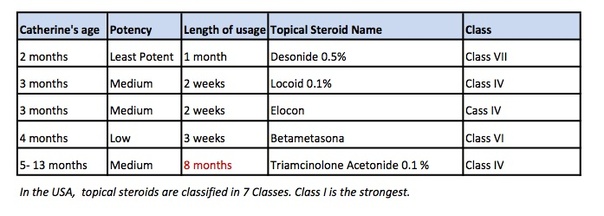| Steroids are also called corticosteroid or cortisone. Steroids are very effective reducing the inflammation on the skin, which is very important to avoid the itching and scratching vicious cycle of eczema. However, it is important to emphasize that steroid creams don't cure eczema. Topical Steroid Creams work wonders for the first months, but since eczema is a chronic disease, they are usually prescribed to be applied on and off as needed. The overuse of these topical creams may have adverse affects on the patient. These risks depend on the strength of the steroid, the length of application, the site treated, and the nature of the skin problem. Catherine was prescribed with eczema when she was 2 months. After being seen for multiple specialists their standard advice was to put some steroid cream on it. We did it for a year, but then, we notice that Catherine was becoming dependent on the creams and as time went by they were becoming less and less effective. We came up with the idea of Topical Steroid Addiction, after reading an article called 'Understanding Eczema' from the New York Times blog website, on which one of the readers claimed the following: "...eczema was only a childhood illness before the 1950's (before steroid creams were introduced). With topical steroids, children started carrying their eczema into adulthood because at some point turned into an addiction to the steroid cream. " Then, we did our own research and we found ITSAN.org, a nonprofit organization that raises awareness of Topical Steroid Addiction. This website provides useful information for those who want to stop using steroid creams. The testimonials are heart wrenching and give hope specially for those who have been brainwashed by doctors that there is no cure for eczema. The following table shows Catherine's road to Topical Steroid Addiction: |
| I didn't include Prednisone, an oral steroid, that was prescribed for a week when she was only 3 months and Protopic 0.1%, an alternative treatment for steroids, used during 8 months to be applied on her face. As parents we felt uncomfortable with all these medications, specially Protopic which has a black box warning with cancer listed as a side effect. We were against the exchange between skin rash for cancer, but at the end, doctors always brainwashed us into thinking that our daughter could get a serious infection if the rash is out of control. Don't get me wrong, I'm not against steroids. I'm against the way the medical community prescribes steroid creams on babies and the lack of education they provide to parents about long term dangers. Unfortunately, in our case we had to learn the hard way. Here are some important things we have learned about steroids through experience: - The importance to taper off It is important to wean off steroids correctly in order to avoid rebound symptoms. - The use of steroids with wet wraps Our doctor recommended us to apply a steroid compound on Catherine's body, arms and legs after a bath using wet wraps to enhance absorption. According to literature, growth and development could be affected in babies and young children who have absorbed steroids in their bloodstream. The evidence is that Catherine didn't gain weight for six months and her growth slowed down. - Vulnerability to infections Steroids and Protopic are immune inhibitors and thus may weaken the immune system leaving the patient susceptible to other diseases. Catherine got Impetigo twice, conjunctivitis and Staph infection in a six month period. - Side effects of steroid overuse The prolonged used of these creams creates the phenomenon of steroid addiction. Catherine has also experimented perioral dermatitis (rash around the mouth), red face syndrome, skin thinning, easy tearing of the skin and swollen body parts. My advice to parents going through this tough journey is to find out the culprit that triggers your kids eczema instead of relying on steroids, medications and doctors. Doctors do their job by controlling the condition in the short term, but that's it. Instead, get allergy tests, have a daily journal, have a healthy diet, investigate by yourself, but the most important TRUST your instincts. |

 RSS Feed
RSS Feed
